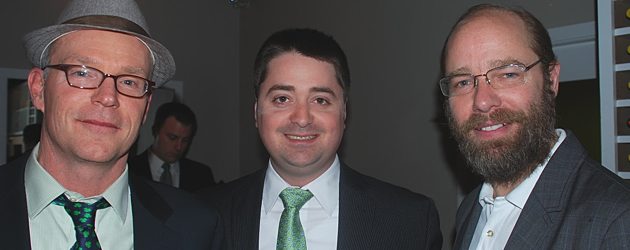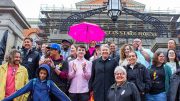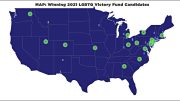
Brian and Brian R. Mahoney, parade marshal for the Allied War Veterans St. Patrick’s Day parade. CLICK on the photo to view more pics!!
Main Featured Image: L-toR: Michael Kennedy, Josh Zakim, and Jeff Ross at the 5th annual “LGBT and Allies St. Patrick’s Day Celebration.”
All Photos: Chuck Colbert
See the rest of the photos here!
By: Chuck Colbert*/TRT Reporter—
Gay pride unfurled its rainbow colors to brisk March breezes in the South Boston St. Patrick’s Day parade sponsored by the Allied War Veterans Council—almost as explicitly as it did in an alternative parade that followed afterwards.
It’s not as if LGBT people had not marched in the War Veterans annual event before. For years they had; nobody denied that, not even parade organizers. However, gays were not able to openly identify themselves, and for several years, openly LGBT contingents participated in a second parade sponsored by Veterans for Peace. St. Patrick’s Day 2014 was decidedly different.
For weeks, Boston Mayor Martin J. “Marty” Walsh tried, albeit unsuccessfully in the eleventh hour, to broker a deal for MassEquality, a gay advocacy group, to march with openly identified LGBT veterans.Yet two South Boston-based community groups—an association of non-profits and a neighborhood association—persuaded parade sponsors to let them in—not as gay groups per se, but as contingents celebrating the local South Boston community’s ever-increasing diversity mix, which includes LGBT people in growing numbers.
Overall, a warm reception on parade day
When parade marchers trekked the four-mile route Sunday, March 16 through Southie, there was little mistaking the South Boston Association of Non-Profits group, its members sporting “I am South Boston” T-shirts and rainbow banners held high, and the St. Vincent’s Lower End Neighborhood Association with its flatbed float of seven faux cannons aiming but not firing rainbow streamers at a pot of gold.
The nonprofit group—roughly 40 to 50 strong—handed out “I am South Boston” stickers. Their rainbow banners proclaimed: “We stand for equality,” “We stand for respect,” “We stand for inclusion.” The neighborhood association—roughly 20 strong—handed out hundreds of green-beaded shamrock necklaces. It’s banner proclaimed, “Celebrate the diversity of Boston.”
In the second, alternative parade, Boston Pride carried a large Rainbow flag, a symbol of LGBT rights and liberation. All along the parade route, LGBT marchers who participated in both events said they were greeted enthusiastically, sometimes wildly, with spirited applause and thumbs up.
“We’re getting a huge welcome from the people of South Boston as soon as they see the rainbow flag,” said Sylvain Bruni, president of Boston Pride. “We’re happy.”
Bruni and the Pride contingent marched in the Veterans for Peace parade.
“We haven’t heard a negative comment out of thousands and thousands of people,” said Randy Foster, an Air Force veteran of Desert Storm and organizer, along with his husband Steve Martin, of the St. Vincent’s contingent in the first parade.
For the most part, “Sure they know,” Foster said, referring to the look of the float, its diversity theme, adding,“There are only guys here, with a few women who joined us.”
Still, he readily acknowledged, “There will always be somebody who won’t know.”
In all, the parade was its usual mix of all things Irish—pride and revelry and more—including everything from marching bands and military units to a troop of bagpipers and one of the Ghostbusters playing to a small contingent of four-legged, canine Irish setters. The crew of the Boston-harbor based Navy ship USS Constitution marched, and a small group of Boston Marathon bombing survivors, including nurses and physical therapists, trekked for the more than two-hours it took to complete the entire parade route.
Both parade organizers pleased
Equally upbeat as their respective event marchers, Allied War Veterans parade marshall Brian R. Mahoney and St. Patrick’s Day Peace parade organizer Pat Scanlon, both declared the day a grand success.
“I am glad that people of good will with honest and open minds—we’re all good people—came to some accommodation,” said Mahoney, who marched with his son, also named Brian.
Scanlon said he was pleased the two neighborhood groups were included.
“I think the whole thing is breaking down,” Scanlon said, referring to the War Veterans banning the explicit mention of sexual orientation or gender identity in clear signage with the words gay, lesbian, bisexual, or transgender—what a Boston Globe columnist referred to as “the persistence of prejudice.”
Furthermore, Scanlon said, “We had a great time marching in our parade.”
Scanlon also voiced praise for Mayor Walsh.
“I congratulate him for standing on principle,” said Scanlon. “He’s shown what kind of a mayor he is going to be. He tried the best he could. Next year will be different.”
Born on St. Patrick’s Day, Scanlon serves as coordinator of the Smedley D. Butler Brigade of Veterans for Peace, which hosts the alternative parade.
Most politicians decline to march, but not all
Until the last hours, Mayor Walsh continued to press parade organizers for inclusion of openly identified gay veterans, as did U.S. Representative Stephen F. Lynch of the Massachusetts 8th Congressional District, which includes South Boston.
Along the parade route on East Broadway, Lynch said to a reporter and gay veteran, “You are welcome in this parade.”
However, most politicians and candidates for office declined to march because of organizers’ discriminatory policy banning openly gay parade contingents.
The Allied War Veterans Council, as a private organizer, won the constitutional right to ban LGBT groups and others they deem not in accord with the parade’s theme in a 1995 U.S. Supreme Court decision, Hurley v. Irish American Gay, Lesbian and Bisexual Group of Boston.
Relying on that decision, the Allied War Veterans have also excluded the Ku Klux Clan and Fred Phelps virulently anti-gay Westboro Baptist Church. [pullquote]In addition to Lynch, other elected officials marching were Boston City Councilor At-Large Michael F. Flaherty and District 3 Councilor Frank Baker, as well as state Representative Nick Collins of the 4th Suffolk District. Baker and Collins’ districts include South Boston.[/pullquote]

Stonewall Rebellion Veteran and Friends, with Erica Jay-Webster, in the middle.
Photo: Chuck Colbert
In addition to Lynch, other elected officials marching were Boston City Councilor At-Large Michael F. Flaherty and District 3 Councilor Frank Baker, as well as state Representative Nick Collins of the 4th Suffolk District. Baker and Collins’ districts include South Boston.
However, most of the state’s Washington delegation in the U.S. House and Senate declined to march, as well as all candidates for governor with the exception of ardently anti-gay attorney and activist Scott Lively, author of book, The Pink Swastika, which alleges gays were the driving forces behind Nazism and the Nazi’s most horrific atrocities.
Mayor Walsh’s perspective
For his part, Walsh, who also did not march, issued a short statement, just before the parade stepped off near the Broadway station T stop.
“I’m disappointed that this year, I will be unable to participate in the parade,” Walsh said, explaining, “As mayor of the City of Boston, I have to do my best to ensure that all Bostonians are free to participate fully in the civic life of our city. Unfortunately, this year, the parties were not able to come to an understanding that would have made that possible.”
Mass Equality’s perspective
For its part, MassEquality voiced disappointment in not being able to march. At the same time, Kara Coredini, the executive director of the state’s leading grassroots advocacy organization said she was “pleased” the mayor kept his promise to skip the parade if organizers continued “to ban LGBT groups from marching openly.”
“It can be difficult for people who are not LGBT to understand how important it is for LGBT people to be able to be open and honest about who they are and how wounding it can be to be asked to be not too out,” Coredini said. “MassEquality had hoped that a small group of LGBT veterans that we work with would have been able to march behind their standard—a rainbow flag—and a banner identifying them as lesbian, gay, bisexual and transgender veterans associated with MassEquality.”
While “disappointed,” she said, “We thank the mayor for championing full inclusion all the way until the end.”
An upbeat Coredini added, “We are encouraged by today’s small step forward with the inclusion of a ‘diversity’ float, and we hope that it is a sign that next year applications from LGBT groups, like MassEquality, that wish to join the celebration of Irish heritage and the service and sacrifice of veterans, will be accepted on their own merits and the decades long ban can finally be lifted.”
Why they marched: significance of marching
Lining up before the parade, members of the South Boston Association of Non-Profits contingent spoke about participation this year and the significance.
“It is important for me as a lesbian to be here and important for me as an African American to be here,” said Gail Burton of Jamaica Plain, who marched with Medicine Wheel Productions, a non-profit arts group aligned with the non-profits association. “It’s also important for me to show up for civil rights movement work whether it’s just one group of us or all of us being able to included. If we are the first drop in the bucket, let’s be that.”
Medicine Wheel’s chief curator Kathleen Bitetti said she was marching to support Michael Dowling and the work he had done for decades in South Boston for inclusion and diversity.
“Our marching is a huge breakthrough, whether people understand or not,” Bitetti said. “Hopefully they will in time.”
A resident of South Boston, Bitetti added, “I’ve always said this was an inclusive community on the whole, and we are here to show that.”
Another Southie resident, Charles Howes of Andrew Square, said he was happy to be marching in order “to create community within community to celebrate diversity among people passionate about serving the people of South Boston.”
Howes serves as deputy director of Still Harbor, a non-profit organization that “works to elevate spirituality and sustain social change,” he said.
Michael Dowling, founder and artistic director of Medicine Wheel Productions, also spoke to the significance of the two neighborhood groups’ inclusion in parade.
“The power of these two groups is they are voices from the community,” Dowling said, pointing to the neighbors-being-neighborly nature of the organizations that provide a variety of services to the community encompassing everything from housing to addiction and recovery to recreation and the arts to mental health services.
Dowling also serves as president of the South Boston Association of Non-profits.
Longtime resident and native of South Boston Bob Monahan also summed up the group’s inclusion and significance.
“It cannot be said that gay people were not invited to march in the parade. It cannot be said,” explained Monahan, director of Julie’s Family Learning Program, another one of the South Boston non-profits association’s participating organizations.
“What is significant is that the Allied War Veterans acknowledged and put in writing something, which was true: Our unit reflects diversity—black, white, every religion, even Presbyterians, and yes, the LGBT community,” Monahan said.
In its back and forth with parade organizers, Monahan said, “We would not take [LGBT inclusive language] out of the application.”
“We did adjust the signage, but it came out better,” he said, referring to the rainbow banners and stickers.
For years Monahan has been active with the non-profits association, having served as former president.
Parties, beer, and afterthoughts
Even as the street sweepers began to clean up, the post-parade parties were well underway.
At one house party on K Street, Todd Russell of the South End who marched with the St. Vincent’s Lower End Neighborhood Association, offered yet another assessment of the parade.
“I think what happened today—although some people may not have understood what happened—is [that] we were in the parade,” Russell said. “While the effects are not necessarily felt today or understood, they will be in the future,” that is to say, “some understanding and acceptance, which is the point.”
Russell added that the group’s marching was not “in your face.” Rather, it was “casual kind of Southie—live and let live.”
Last call
Just as they have for five years now, a crowd gathered for the annual “LGBT and Allies St. Patrick’s Day Celebration,” held this year Monday, March 17 at the South End restaurant Stella.
At the event, District 8 Boston City Councilor Josh Zakim said he viewed the previous day’s parade as a “breakthrough.”
“I applaud Mayor Walsh for his efforts,” said Zakim. “No one doubts his trying the best he could to make [the parade] a welcoming event for everyone to participate. It’s very clear we’re on the right track. I don’t think I’ll be hosting the event next year and certainly the year after.” [pullquote]“We’re making progress. It’s not a matter of whether we can march in the parade, but how and when,” —Boston attorney and gay rights activist Jeff Ross of Roxbury/South End.[/pullquote]
Boston attorney and gay rights activist Jeff Ross of Roxbury/South End also said this year’s turn of events were positive.
“We’re making progress. It’s not a matter of whether we can march in the parade, but how and when,” Ross said.
Michael Kennedy of Cambridge, who marched in 1993 with the Irish American Gay, Lesbian, and Bisexual Group of Boston, explained why marching was important to him.
“It doesn’t matter about any add-on to my identity as person first or an Irish person second,” Kennedy said. “That fact that I am gay, so what?”
Parade organizers’ dismissive attitude toward his sexual orientation bugs Kennedy.
“They put their foot down, looking at me as someone who’s gay, not as someone who’s Irish and has a natural in,” he explained. “I can’t believe we are still discussing this in 2014.”
Last word
The editorial page of the Boston Globe also weighed in on the St. Patrick’s Day parade progress.
“The parade was a picture of what gay-rights advocates have spent decades seeking,” the editors wrote. “It showed how much the nation, the city, and the South Boston neighborhood have changed.”
Yet the Globe noted, “The event was a failure because MassEquality, the gay-rights group, was once again denied permission to march.”
For her part, longtime gay rights activist and Beacon Hill lobbyist Arline Isaacson, with close ties to Mayor Walsh, offered her perspective.
“It’s a breakthrough,” she said, referring to this year’s LGBT visibility in the parade. “There will be more.”
*Chuck Colbert marched in the 1992 and 1993 South Boston St. Patrick’s Day Parade as one of 25 participants in the Irish American Gay, Lesbian, and Bisexual Group of Boston.









Chuck, I am so glad that you have written this story including the the groups of LGBT persons that marched in the St. Patricks Day Parade. Maybe next year many more will be encouraged to join as well. Great job!
I understand a group representing the STONEWALL veterans, who in 1969 rebelled and fought in the streets of Greenwich Village,NY against police harassment and terror led the LGBT division holding the STONEWALL banner. I find it odd and honestly disrespectful that these veterans and survivors of the Stonewall Rebellion were not even mentioned in your article. If it wasn’t for the Stonewall Rebellion and these pioneers of gay rights I hate to think where we in the lgbt community would be today.It’s great to celebrate our diversity, but lets not forget how we got here.
REMEMBER STONEWALL!!!
Robert, I have a couple of photos of them marching and will ask the TRT folks to post them. Erica Kay Webster is in one of the photos and was quoted in a previous parade-related piece that I did. Of course, we are all indebted to the Stonewall Veterans! Erica et al rock!